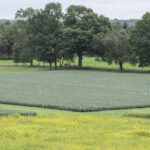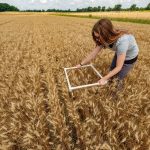Agriculture is the defining feature of many rural North American landscapes. Over time, a focus on productivity and large-scale cultivation of commodity crops has resulted in agricultural landscapes dominated by large, homogenous fields, such as the corn and soy that blanket the Midwest. But agricultural landscapes provide more than just the crops grown on them. They also offer animal and plant habitat, clean our water and air, and capture carbon in the soil—a host of services often termed ecosystem services. Many key co-benefits are thanks to insects and other arthropods: they pollinate
Long-term data reveals how no-till agriculture increases crop yields and environmental gains over the long haul
Despite the environmental benefits of no-till agriculture, farmers often hesitate to change to this management approach due to uncertain economic returns. Sarah Cusser, postdoctoral research associate at the Kellogg Biological Station (KBS), and MSU terrestrial ecologist Nick Haddad, director of the Long-term Ecological Research (LTER) program at the Kellogg Biological Station (KBS) and professor in the Department of Integrative Biology, however, have just published a study in Global Change Biology that clearly demonstrates significant benefit

